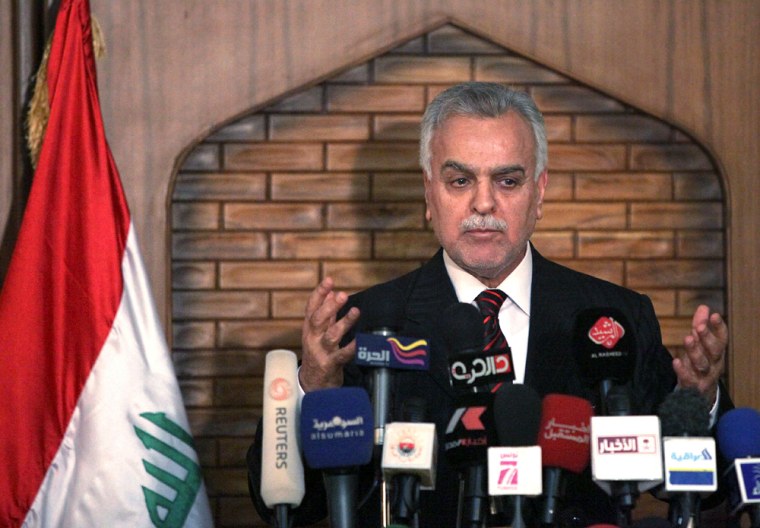Iraq's path toward political stability after years of war threatened to veer off course Wednesday when a vice president vetoed part of a key election law, a move likely to delay a national vote slated for January.
The United States has linked the pace of its military drawdown to the vote, but the top U.S. commander in Iraq told reporters the schedule was on track for now. All American troops are supposed to leave by the end of 2011, and the prospect of a delay could burden the White House as it ponders a bigger military deployment in Afghanistan.
The veto by Iraq's Sunni Arab vice president also exposed sectarian divisions that reached heights of fury in 2006 and 2007, when Shiite and Sunni Arab militants turned much of Iraq into a slaughterhouse. A return to such levels of violence is unlikely, but deep mistrust has slowed political reconciliation.
Vice President Tariq al-Hashemi sent part of the law back to parliament, 10 days after lawmakers ended weeks of haggling and approved it to the relief of Washington. He said it should be amended to allocate more seats to Iraqis abroad, most of whom are Sunni Arabs who fled the war.
The U.N. estimates that as of January there were around 2 million Iraqi refugees in neighboring Jordan and Syria, and some 2.6 million people displaced within Iraq. The total population is at least 27 million.
"My objection is not to the entire law, but only the first article in order to be fair to Iraqis living abroad," al-Hashemi said. "I hope that parliament will hold a vote soon on the suggested amendments so that elections can be carried out at their scheduled date."
As one of three members of Iraq's presidential council, al-Hashemi holds veto power over legislation.
The prime minister of Iraq's Shiite-led government slammed the veto as a threat to democracy. Parliament must now discuss al-Hashemi's demands and take a vote on them, a process that could take days or even weeks given the legislature's fractious nature and its track record.
Preparations suspended
Already, the country's election commission said it has suspended preparations for the vote. The constitution requires parliamentary elections by the end of January, but the schedule is actually tighter because Iraq is almost certain to avoid holding a vote during a Shiite religious festival toward the end of that month.
"We're disappointed in the developments today regarding the elections law," Philip Frayne, a spokesman at the U.S. Embassy in Baghdad, said in a statement. "We hope that a quick resolution to this dispute can be found so that elections can go forward in January."
No date has been set for the vote.
Gen. Raymond Odierno, who leads U.S. forces in Iraq, said at a news conference that the military can adjust its withdrawal plans if the need arises, but that no decision has to be made before late spring.
"We're set up and we're flexible enough between now and the first of May," he said. There are currently 115,000 American troops in Iraq.
U.S. military officials have said they will begin to draw down combat forces about 60 days after the election, hoping for assurances by then that Iraq is on stable footing. All U.S. combat troops must be out of Iraq by the end of August 2010. Other troops, including training and support personnel, must leave by the end of 2011.
A further complication arose Tuesday when Kurdish leaders threatened to boycott the election unless the three northern provinces they control are given more seats in the next 323-seat parliament. Kurds run a virtual mini-state, complete with its own flag and security force, but they have stopped short of seeking independence.
It was not immediately clear when parliament would take up the vice president's suggestions, or what precise impact they would have on the date of elections.
‘A serious threat’
Qassim al-Aboudi, a member of Iraq's electoral commission, said al-Hashemi's move will likely push back the election and that the commission has suspended preparations for the vote.
A member of the parliamentary legal committee, Kurdish lawmaker Khalid Shwani, said committee members will study al-Hashemi's suggested changes as soon as they receive them.
Prime Minister Nouri al-Maliki criticized al-Hashemi's veto, calling it "a serious threat to the political process and democracy."
"It has no solid constitutional basis. The high national interests were not taken into consideration," al-Maliki said in a statement on his Web site.
The prime minister, who has been locked in a bitter rivalry with al-Hashemi since taking office in May 2006, also urged parties to forge ahead with their election preparations.
